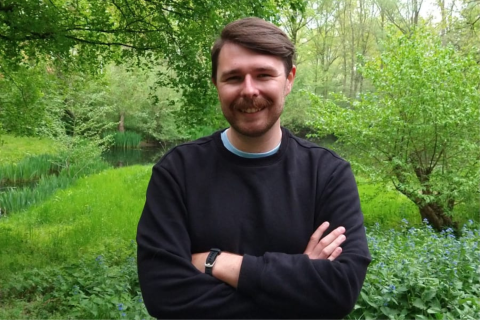Testimonials
Jennifer Beckwith is Policy Advisor at the CBI
"I chose this Master’s programme because I wanted to continue with interdisciplinary study. I had done History and Politics at undergraduate level and wanted to further explore the sociological, historical, political and economic forces that shape our contemporary world. I really liked the programme’s focus on ‘institutions’ because I was interested in working in government or the public sector after studying. The careers of former students also appealed to me, as did the strength of Utrecht University in international league tables."
Read more
"I like the choice offered by this programme to study either a theoretical or practical track. There is even greater flexibility within this, for example I wrote a theoretical length thesis within the practical track as I worked on a research placement at the International Institute of Social History in Amsterdam. This enabled me to choose exactly the topic I wanted to research (labour coercion), and meet leading researchers and academics in the field. Being able to combine the theoretical and practical track gave me a breadth of study and the real-world experience of a research organisation which I doubt would have been possible at other Universities, certainly not in the UK.
In April I became a Policy Advisor at the CBI, the UK’s largest business membership organisation. It works closely with government to shape everything from education to energy policy. I work in the employment team and lead on inclusion policy, forming recommendations to improve diversity in employment and workplace progression. This involves responding to government reviews by convening businesses to gain practical insight on how policy changes will affect their organisations. It also involves showcasing businesses with good employment practices and sharing these with government and other businesses. Sometimes it involves interpreting legislation after government passes new employment regulation, and helping organisations to apply it in their business and understand the impact."
Willemijn Luchtenbelt is Area Director Maarssen and Environment Manager at Municipality Stichtse Vecht

"After my Bachelor's degree in History, I deliberately chose the Master's programme in History of Politics and Society in Utrecht. During my Bachelor's I was already interested in political issues in history with a contemporary relevance. Themes of which I wanted to better understand the historical context were participation, citizenship, social movements and democracy."
Read more
"The Master's programme in History of Politics and Society offered me the opportunity to go deeper into these subjects. The combination of theory and practice by doing an internship also appealed to me. During my Master's, I completed two internships. The first internship was at the engineering firm Royal HaskoningDHV. I did research on the changes that the Department of Rivers, Deltas and Coasts went through in the last 50 years. For this purpose I conducted interviews with (former) employees of Royal Haskoning, who have been active in the international water sector for many years. This resulted in a small publication. The research gave me a good insight into the working methods and changes in the water sector.
As a follow-up, I did an internship at the Dutch embassy in Hanoi. My assignment there was to analyse the direct and indirect effects of the Mekong Delta Plan.
During both internships - plus a Master's thesis on partnerships in the water sector - I learned a lot about the Dutch water sector. In addition, both internships provided me with more insight into spatial planning. Via the Dutch Career Fair, I ended up at the municipality of Stichtse Vecht. I became Area Director. My interests and qualities came together well in this job. As an Area Director I am mainly concerned with citizen and government participation. Themes that are also dealt with theoretically in the Master. Also the work in the Mekong Delta has everything to do with the involvement of citizens in the success of the implementation of the Mekong Delta Plan. After all, a government project, even an international one, has no chance of success if there is no support from the community.
Unlike some other colleagues at the municipality, as a historian I have learned to take in a lot of information, ranging from policy documents to personal interests. Through my studies and internships I have learned to distil the main points and in this way to work in a solution-oriented way."
Robert Keenan is a Phd Candidate at Wageningen University

"After my Bachelor’s in History I worked full-time in customer service for a number of years but always knew that I wanted to continue to pursue my studies. The Master’s programme in History of Politics and Society at Utrecht University represented a chance for me to update my knowledge of contemporary debates in a broad range of historical topics as well as equipping me with the analytical abilities to understand the complex world around me. The interdisciplinary focus of the courses offered through the programme promised to allow me ample room to explore the subjects that I was most interested in, expanding beyond history into economics, political science and sociology."
Read more
"Although I was nervous to return to academia as an international student, I found myself supported throughout the programme by a number of endlessly knowledgeable and passionate faculty members who challenged me to do better and helped me to develop my own research. As someone who cannot speak Dutch, I was anxious about the internship component of the programme but again found myself supported by an academic staff that rewarded curiosity and hard work. Through these faculty members, I took part in an internship at the International Institute of Social History where I had first hand experience of the highest levels of academic research, writing and publishing. This internship helped me to realise that I wanted to continue with a career in research beyond the Master’s programme.
During the programme itself, course themes such as economic growth and inequality over a long-run perspective opened my eyes to an unfamiliar mode of research and prompted me to dig deeper into the interconnected economic development of global regions. Through the taught programme, my internship and the experience of writing my thesis on the economic development of Hong Kong and Macau since the nineteenth century I developed new skills in the study and writing of economic history. In the year subsequent to my completion of the Master’s programme in History of Politics and Society at Utrecht University, I began a PhD candidacy at Wageningen University studying historical migration patterns and economic development in Southeast Asia. It is no exaggeration to suggest that my ability to pursue a PhD candidacy was the direct result of the wonderful people I met during my studies at Utrecht University, as well as the skills they imparted upon me and the world which I discovered through them."

